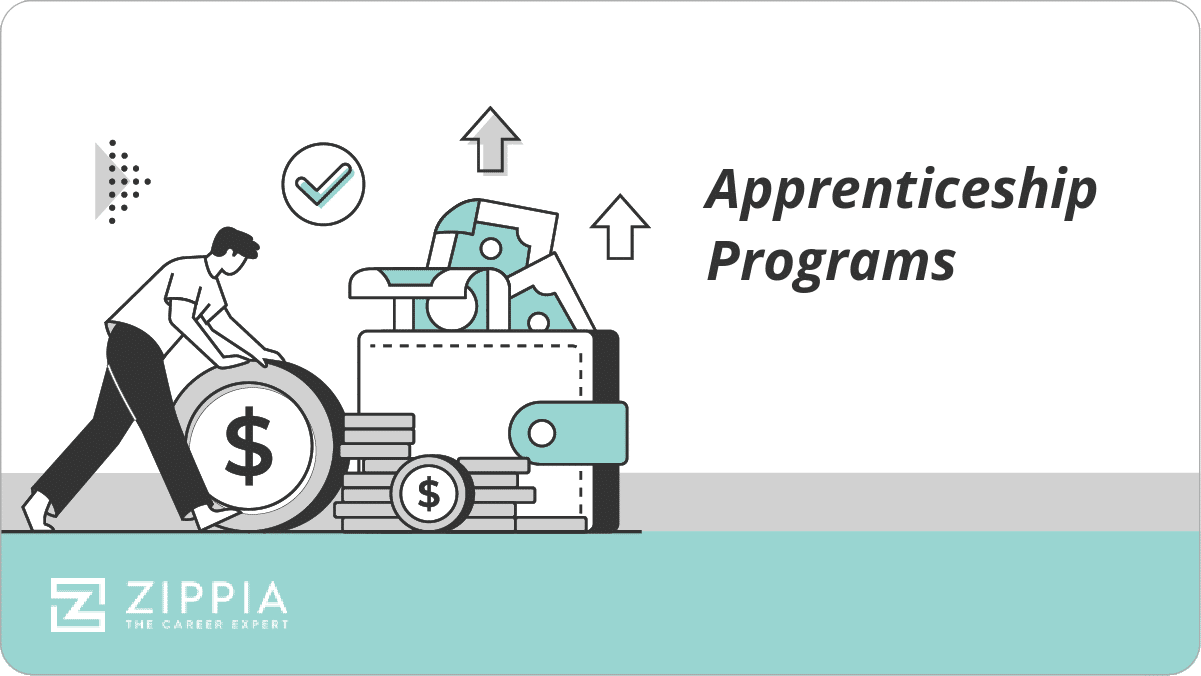- Degree Information
- Certificates And Degrees
- Skills To Learn
Find a Job You Really Want In
If the idea of spending four years in a classroom after high school is the last thing you want to do, you might be a perfect candidate for an apprenticeship program. It can get you into a career faster and have you earning a competitive wage while your friends are still turning in homework assignments.
If that sounds interesting to you, keep reading.
Key Takeaways:
-
An apprenticeship can be an alternative to a traditional classroom education if you want to get hands-on training in a particular profession.
-
Apprenticeships can also be a great way to get your foot in the door with a company and enter the workforce earlier.
-
Apprenticeship programs can traditionally be found for skilled trade jobs such as mechanic, electrician, cosmetologist, and more.

Why Become an Apprentice?
Some people just love the idea of joining the workforce earlier. They hate school and certainly don’t want to earn a bachelor’s degree. But they want to work in a skilled profession and have the opportunity to do more, earn more money, and have a great occupation.
Those are fantastic reasons for taking this career path, but there’s one more that might be even more compelling. An apprentice program might be required for your field. It’s true; becoming an apprentice might have nothing to do with what you want. Your wants are entirely irrelevant when it’s a required part of a profession.
Benefits of Apprentice Training Programs
Hands-on training while you work in a profession that you want to master. This concept is about as old as the concept of professions themselves. It’s the way people used to learn how to perform a trade. Blacksmiths had blacksmith apprentices, and journeymen had journeyman apprentices. When you think about it, the first Neanderthal to use a tool for hunting probably taught others, turning them into his apprentices.
There is a long human history of experts teaching others a skill or a trade. The reason this practice continues today is that there are so many benefits to learning things this way.
-
Kinesthetic learning. This is learning by doing, and for some people, this is the only way to learn (or the best way, at least).
People who prefer interactive learning tend to go into the arts and manufacturing or creative fields like dance, acting, jewelry making, carpentry, physical therapy, and carpentry. All of these fields have on-the-job training elements to them, and often, that learning never stops.
-
Customized training. For the apprentice, they get to learn about a profession that interests them, and they don’t have to waste time with a lengthy, well-rounded education. For the employer, they can train people on how they specifically like to have things done.
-
Professional pipeline. The trades that require apprenticeships are constantly feeding their industry supply and demand cycle. Do you have a lot of plumbers retiring soon? Well, it’s time to bring on more apprentices. It’s that easy.
-
Job security. For employees, once you get into your apprenticeship program, you stand a great chance of getting a job and staying employed. That’s incredibly valuable in this era.
-
Continued learning. Many apprentices are not new to the field; they’re just adding to their skill sets. It’s not uncommon to have refresher apprenticeships for established employees or professional certificate training that lets you advance in your career through on-the-job learning.
-
A culture of cooperation. One benefit to employees and employers that often gets overlooked is the atmosphere or assistance that happens when you have an apprenticeship program.
Everyone in the company knows what it’s like to learn from others and then instruct others. That makes it much easier for people to ask questions, get help, and continually cooperate. It creates a sense of camaraderie that makes work more enjoyable.
How to Become an Apprentice
Think that you want to be an apprentice and learn your career that way? There are things you can do to start on this journey:
-
Pick a career. The United States Department of Labor has a website dedicated to apprenticeships. If you think this might be the best way for you to learn and earn, check out the careers that use an apprentice model.
-
Find an apprentice program. You know what profession you want. Now it’s time to find a program that works for you. You might have to move to find the program you want. You also might find that some have different requirements, timeframes, etc. that would make them more appealing.
Apprentice programs are offered through businesses, industry associations, state workforce systems, colleges and tech schools, and community organizations.
-
Meet the eligibility requirements. Age is the first hurdle for most people. Many apprenticeships can start as early as age 16, but others will need you to be 18.
Beyond that, some require a certain level of education, whether you’re a high school graduate, have taken aptitude tests, or you’ve had some education or training beyond high school. You might even find that your chosen job demands a specific grade point average.
-
Apply for the program. Not everyone who applies gets in. Even if you have all the right qualifications, there could be a waiting list for the particular job or company you want. If you are not accepted, try to connect with someone at the company to ask them what else you can do to make your application more desirable in the future.
You might have to take an entry-level position to get your foot in the door before you can get into the program.
One thing to note, many people who become apprentices aren’t jumping into this immediately after earning their high school diploma. They might already be working in the field and looking for advancement opportunities.
It could be that they want the certification to start earning more and doing more. In some situations, regulations change, and people who have done a job for years now need to learn additional skills to be effective and competitive.
What Do You Need to Know Before Becoming an Apprentice?
The one thing you need to know before becoming an apprentice is if it’s required. Some jobs require this mentor/mentee type relationship. There’s simply no getting around it. Other professions don’t have an apprenticeship model; you get the job, and you’re thrown right in without that middle ground training period. Find out what your dream job requires.
One key thing to note: apprenticeships are more than just paid internships. They’re structured to teach you specific skills in a predefined order. There are also many opportunities for the individual to prove their knowledge and mastery of the skills.
True apprenticeships are completed with some type of certification. These nationally accredited certifications are valid in all of the states that participate in the program.
Professions With Apprentices
You’ve decided that an apprenticeship is the way to go – you get to start earning money faster, and you’ll still end up with professional skills and a career you can be proud of. The problem? You’re still not sure what you want to be. The following are some (not all) careers that traditionally use an apprenticeship program to train and hire:
-
Electrician. Learning to work with electricity requires a lot of skill and practice. A hands-on learning model with an expert is a safe way to learn this skill.
-
Auto mechanic. The ins and outs of repairing and maintaining cars are tricky. Each year new models come out, and every few years, there are drastic changes to vehicles. You may find additional education and training are needed throughout your career.
-
Master brewer. Want to learn how to brew the best beer around? Then step away from your garage brew setup and train to become a master brewer.
-
Pharmacy technician. Your attention to detail and knowledge base needs to be spot-on for this profession. Luckily, you can learn on the job with the guidance of experts in the field.
-
Engineering. There are several different offshoots in this field, and each one has different apprentice programs. If you love learning and doing, this could be the right field for you.
-
Optician. An optician has a lot of technical expertise. They’re the ones who design, fit, and dispense your corrective vision devices. Yes, they’re the highly skilled ones who actually make the lenses for your glasses.
-
Plumber. This is one of the most well-known professions that features an apprentice program. In fact, there are different types of plumbing certifications and apprentice programs. It’s a high paying career, so it’s a field worth getting into.
-
Machinist. Turn a regular block of metal into an intricate and intrinsic part of a machine. This is almost more of an artistic pursuit than a pure industrial one. If you are detail-oriented and love operating complex machinery, becoming a machinist could be your perfect job.
-
Cosmetologist. Hands-on training is necessary for this position. There’s just no way to learn all there is to know about salon styling and work without using other people as guinea pigs. Once you’ve completed your classwork and apprenticeships, then you’ll be ready to take your state licensing exams.
-
HVAC Technician. Heating, air conditioning, and refrigeration systems contain many complex components. Being an HVAC Technician means learning how to diagnose a problem and correct it. It requires a vast amount of knowledge that’s traditionally gained through an apprentice training program.
These are just a few of the jobs you can have if you decide to become an apprentice. There are even more opportunities out there, so start looking.
Apprenticeship Programs FAQ
-
What apprenticeships pay the most?
Skilled trade apprenticeships usually pay the most. This includes apprenticeships as an electrician, carpenter, plumber, or machinist, to name just a few.
These fields generally pay very well, and apprentices earn a portion of the income experts in the field make. As a result, fields that pay their workers more generally pay apprentices more as well.
It’s important to note that companies only have to pay apprentices minimum wage, but they often choose to pay them more. It will, of course, depend on the location and particular organization, but often higher-paying career paths have a higher likelihood of paying their apprentices well.
Other high-paying fields you can enter as an apprentice include:
-
Pile-driver operation
-
Elevator installation and repair
-
Pipefitting
-
Steamfitting
-
Ironworking
-
Tool and die making
The number of apprenticeships in these fields and how much they pay will ebb and flow over the years, but if you’re looking for a way to make any money at all while learning a high-paying occupation, fields like these are a good place to look.
Remember that almost any paid apprenticeship is generally a good investment, though, as you get paid to learn a skill and start your career instead of paying someone else to teach you. Plus, since you won’t have student loans, you’re more likely to be able to start your career debt-free.
-
-
What is the best apprenticeship program?
The best apprenticeship program is one that trains you and gives you a good foundation in a career that you want to pursue.
An apprenticeship is temporary, while your career is long-term. So, as long as your apprenticeship gives you the quality training and experience you need to have a successful career in a field you’re interested in, it’s the best one for you.
If you’re faced with deciding between several apprenticeships, though, there are some factors to consider that can make one better or worse than another.
Good pay, for one, can make an apprenticeship easier to be a part of because you can then focus on your program instead of on how to make ends meet.
The experience and reputation of the professional(s) mentoring you can also be a major factor in what sets an apprenticeship apart. Try to find one with a respected company where you know you’ll get good quality instruction and coaching.
In addition, you’ll want one that gives you the experience you actually need. If you want to be a carpenter because you want to frame houses, for example, apprenticing with someone who mainly does cabinetwork may give you an interesting experience, but it won’t give you a good foundation for your career.
This is also an important thing to be aware of if you’re already working in your field of choice and you want or need to do an apprenticeship to further specialize or learn a new technique within that field.
-
How old do you have to be to become an apprentice?
You have to be at least 16 years old to become an apprentice. Some apprenticeships even require you to be 18 years old.
In addition to age, you’ll also have to meet any education or work experience requirements. Depending on the apprenticeship, you might need to have your high school diploma (or equivalent), pass aptitude tests, or go through training or certification programs. Some even require a certain GPA.
Others require apprentices to have held an entry-level position in the field for a certain amount of time before applying or to have some professional experience.
If you’re not sure that you’ll easily be able to meet all of the requirements for the apprenticeship of your choosing, look into attending your local tech school to acquire experience and certifications.
Talk to your school guidance counselor about what you want to do, as they’ll have resources for you as well. If you know someone experienced in the field you want to enter, ask them what they did and what they recommend you do. Often getting advice directly from one expert is more valuable than trying to sift through the many internet “experts.”
Whatever you choose to do, start researching the requirements earlier than you think you need to so that you’ll have time to meet them before you plan to begin your apprenticeship.
-
How long is an apprenticeship?
An apprenticeship is usually about four years. This depends on the industry and particular apprenticeship program, as some only last one year and others last up to six years.
More specifically, the U.S. Department of Labor has a set number of working hours that apprentices need to complete before being fully certified to work on their own. The DOL also often has class hour requirements, which organizations usually build into their apprenticeship programs somehow.
As a result, the length of an apprenticeship may vary from person to person. Some people may be able to work more hours than others, allowing theirs to go by faster. Many organizations can give you at least an estimate of how long it will take, though.
If you attend a tech school program during or after high school, some of the classroom and hands-on training hours you get there may apply toward your apprenticeship hours, so be sure to ask before you sign up.
As you’re looking into becoming an apprentice, whether you’re going to a tech school or not, it’s always important to ask the company how long it will take. This way, you can prepare your finances, schedule, and expectations and determine if it is a good fit for you or not.
- Degree Information
- Certificates And Degrees
- Skills To Learn





